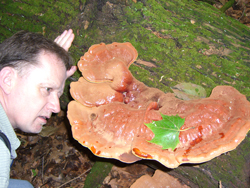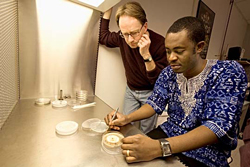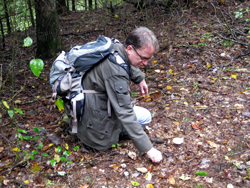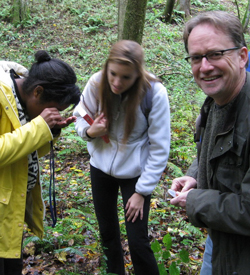Nicholas Money
The honor of membership into Sigma Xi spans disciplines and courses of research study. Each month in the Sigma Xi Today, we will be highlighting a different "Fellow Companion"—asking them about their work and what the honor of induction into Sigma Xi has meant for their career.
 A native of the United Kingdom, botanist Dr. Nicholas Money received his BA at Bristol University before beginning his doctoral work in mycology under Dr. John Webster at Exeter in the 1980s. After post–doctoral work at Yale University in the United States and over two decades as an Assistant and Full Professor at Miami University (Ohio), Money is one of the primary researchers in the world of fungi studies—especially as it applies to spores and aerobiology. It's important to also note that in 2012, he was named the Annual Researcher of the Year for the Sigma Xi chapter at Miami University.
A native of the United Kingdom, botanist Dr. Nicholas Money received his BA at Bristol University before beginning his doctoral work in mycology under Dr. John Webster at Exeter in the 1980s. After post–doctoral work at Yale University in the United States and over two decades as an Assistant and Full Professor at Miami University (Ohio), Money is one of the primary researchers in the world of fungi studies—especially as it applies to spores and aerobiology. It's important to also note that in 2012, he was named the Annual Researcher of the Year for the Sigma Xi chapter at Miami University.
Tell us about your educational background including your doctoral research, if applicable.
My interest in fungi began as an undergraduate at Bristol University in the United Kingdom in the 1980s and I enjoyed three glorious years as a doctoral student at Exeter University with the great professor of mycology, John Webster. I graduated in 1986 and left, immediately, for a post-doc at Yale.
Do you have a particular teacher or professor who inspired your love of science? Why?
Mike Madelin was my favorite professor at Bristol. He was an inspiring teacher whose enthusiasm about fungal biology seemed boundless. I worked in his lab as an undergraduate and this experience shifted my perception of biology as a study of big organisms, like us, toward a more sensible view of life as an almost entirely microbial enterprise.
Long before university, my Lincolnshire grandmother introduced me to animals fossilized in Jurassic sandstone and animals croaking in the fens, and taught me the names of British plants.
What is the focus of your current research?
My recent lab research has concerned the mechanisms that launch fungal spores into the air. In particular, we are looking at fungi that cause asthma. Despite more than a century of experiments on spore discharge in fungi, very little is known about how the commonest types of spores in the air get airborne. This is a fascinating problem in aerobiology and we are trying to solve it. I have also begun work on the relationship between fungal spores and cloud formation, but this project is in its infancy and so we are playing around in the lab at the moment, trying to figure out how to test some ideas. I am enjoying this research with my doctoral student, Maribeth Hassett, and my longtime collaborator, Mark Fischer. Mark is a physicist at the College of Mount St. Joseph in Cincinnati and we complement one another's areas of expertise in our biomechanical investigations.
concerned the mechanisms that launch fungal spores into the air. In particular, we are looking at fungi that cause asthma. Despite more than a century of experiments on spore discharge in fungi, very little is known about how the commonest types of spores in the air get airborne. This is a fascinating problem in aerobiology and we are trying to solve it. I have also begun work on the relationship between fungal spores and cloud formation, but this project is in its infancy and so we are playing around in the lab at the moment, trying to figure out how to test some ideas. I am enjoying this research with my doctoral student, Maribeth Hassett, and my longtime collaborator, Mark Fischer. Mark is a physicist at the College of Mount St. Joseph in Cincinnati and we complement one another's areas of expertise in our biomechanical investigations.
In addition to lab research I am working on a number of writing projects, including a book on microbial diversity that is scheduled for publication early in 2014 and another book that will serve as an introduction to microbiology.
Tell us about something we might see in our daily lives that directly correlates to your work.
 The prevalence of asthma has increased greatly in recent years and hundreds of millions of people are allergic to the proteins carried on the surface of fungal spores. Experiments show that the rate of fungal decomposition of plant materials is stimulated by an increase in carbon dioxide concentration and that the fungi produce more spores under these conditions. This raises the possibility that more and more of us will wheeze as the planet gets warmer. By understanding how the most allergenic spores get into the air, we will be able to forecast weather conditions most likely to exacerbate asthma. Public health is tied to the biological activities of the fungi in ways unimagined just a few years ago.
The prevalence of asthma has increased greatly in recent years and hundreds of millions of people are allergic to the proteins carried on the surface of fungal spores. Experiments show that the rate of fungal decomposition of plant materials is stimulated by an increase in carbon dioxide concentration and that the fungi produce more spores under these conditions. This raises the possibility that more and more of us will wheeze as the planet gets warmer. By understanding how the most allergenic spores get into the air, we will be able to forecast weather conditions most likely to exacerbate asthma. Public health is tied to the biological activities of the fungi in ways unimagined just a few years ago.
Give us an example of how multi-disciplinary research directly contributed to your work.
 For the last three years, I have been serving as Director of the Individualized Studies Program at my university. Undergraduates in this program take responsibility for designing part of their plan of study and can mix course offerings from multiple disciplines. This experience has allowed me to work with faculty and students with an incredible range of interests and has broadened the way I look at scientific questions. I am more interested now in considering the history of a particular theory, the social context in which an epidemic disease has played out, and so on. More importantly, perhaps, is the way that I have learned to appreciate the artistic qualities of so much scientific research. There is a beauty, for example, in the recent revelations about the human microbiome that transcends their impact upon medicine. Colored pie charts, bar graphs, and 3D starburst analyses of metagenomic data are mesmerizing.
For the last three years, I have been serving as Director of the Individualized Studies Program at my university. Undergraduates in this program take responsibility for designing part of their plan of study and can mix course offerings from multiple disciplines. This experience has allowed me to work with faculty and students with an incredible range of interests and has broadened the way I look at scientific questions. I am more interested now in considering the history of a particular theory, the social context in which an epidemic disease has played out, and so on. More importantly, perhaps, is the way that I have learned to appreciate the artistic qualities of so much scientific research. There is a beauty, for example, in the recent revelations about the human microbiome that transcends their impact upon medicine. Colored pie charts, bar graphs, and 3D starburst analyses of metagenomic data are mesmerizing.
What are your thoughts on the future of STEM education?
Few but the least thoughtful critics would deny the importance of STEM education in the United States. The challenges facing Homo sapiens in the twenty-first century may be greater than any in our evolutionary history. Population growth and climate change are probable game-changers, but the ignorance of the electorate and politicians has limited meaningful discussion in the public forum. Future options for responding to climate change, and other pressing challenges, narrow with the passage of every year that society devalues scientific discourse. STEM education, as part of a broader commitment to teaching the value of critical thinking, offers the only conceivable path to salvation.
Engagement in scientific inquiry is among the most liberating experiences available to humanity. And the prospect of a life without enjoying some appreciation of science seems almost worthless to me.
Describe the patent/publishing experience—were there any bumps along the way for you?
To do justice to this question would require many pages of reflection. In short, however, publishing of peer-reviewed work requires negotiation of a very bumpy path, but I am a big believer in peer review and have little to complain about from personal experience. Having said this, there are plenty of examples of unconscionable bias in the peer review process that favors scientists whose profiles are based more on reputation than the scientific merits of their arguments in a particular paper. Popular science writing and publication of trade books is a very different experience and one that I have enjoyed immensely.
What has the honor of induction into Sigma Xi meant to you?
I love the sense of community of Sigma Xi and am proud to be associated with an organization that celebrates the pursuit of knowledge.
Has Sigma Xi helped further your career? If so, how? If you haven't started your career yet, how do you believe Sigma Xi will serve you in the future?
Sigma Xi has helped further my career in a very local way, by increasing my awareness of the research interests of students and professors outside my home department.
What books are you currently reading for pleasure?
I turned 50 this year and I read more now, and more widely, than I have done every before. I have just finished volume 3 of Gibbon's "Decline and Fall of the Roman Empire" (three more to go), am enjoying Hobbes "Leviathan," and, for light relief, am reading the salacious bits of a biography of the poet Dylan Thomas. I haven't taken to e-readers (yet) and I never go anywhere without a book. There is so much to read and so little time.
When you're not working on your research, what do you do in your free time?
I read and I write (every day) and I enjoy good food and wine and arguing with friends about politics and religion. My wife and I were blessed to meet, prior to his lateness, Christopher Hitchens, and we have held Hitchens'-inspired parties at our home for friends who felt similar affection for his genius.
What's your favorite movie?
"Brief Encounter" (1945), and, sorry can't pick just one, so "Withnail and I" (1987) too.
What is your favorite motto?
What larks [Pip, from Dickens' "Great Expectations"]
What advice would you give a young researcher just starting out in your field?
Be skeptical about everything, but avoid cynicism for as long as possible.
Sigma Xi just celebrated its 125th year. What advances do you see in your field of research over the next 125 years?
I wonder if we may be approaching a radical reformulation of biology education and research in the life sciences. Biologists have achieved a remarkable level of understanding about the way that multicellular organisms operate, but the majority of professionals continue to ignore the fact that most of life isn't organized into animals and plants. These considerations argue for a different view of life, one in which the birds and the bees, and the trees, are recognized as extensions of the astonishing variety of microscopic life forms, recently-evolved vehicles for ancient genes whose functions were perfected billions of years ago. The smallest forms of life are also an issue for non-biologists, because a failure to comprehend the true nature of biodiversity—the fact that we are soaked in it, filled with it, made of it, and that most of it is invisible—leads us to misplace ourselves. By this, I'm not implying that a sensible human being should ignore the personal value of her life. Descartes wrote about thinking as proof of existence, but we step beyond biological reality if we imagine that we exist as anything more, or anything less, than complex mixtures of cultured microorganisms.
The truth of life looks nothing like the traditional tree where almost everything is an animal and the vastly more numerous oddities are squashed at the base under an icon that looks like an amoeba or a hairy bacterium. To teach a course on biological diversity lasting the standard three month American semester and to spend more than one class on the animals is to encourage an absurd caricature of life. The way that we teach biology is no more sensible than evaluating all of English Literature by reading nothing but a Harry Potter book.